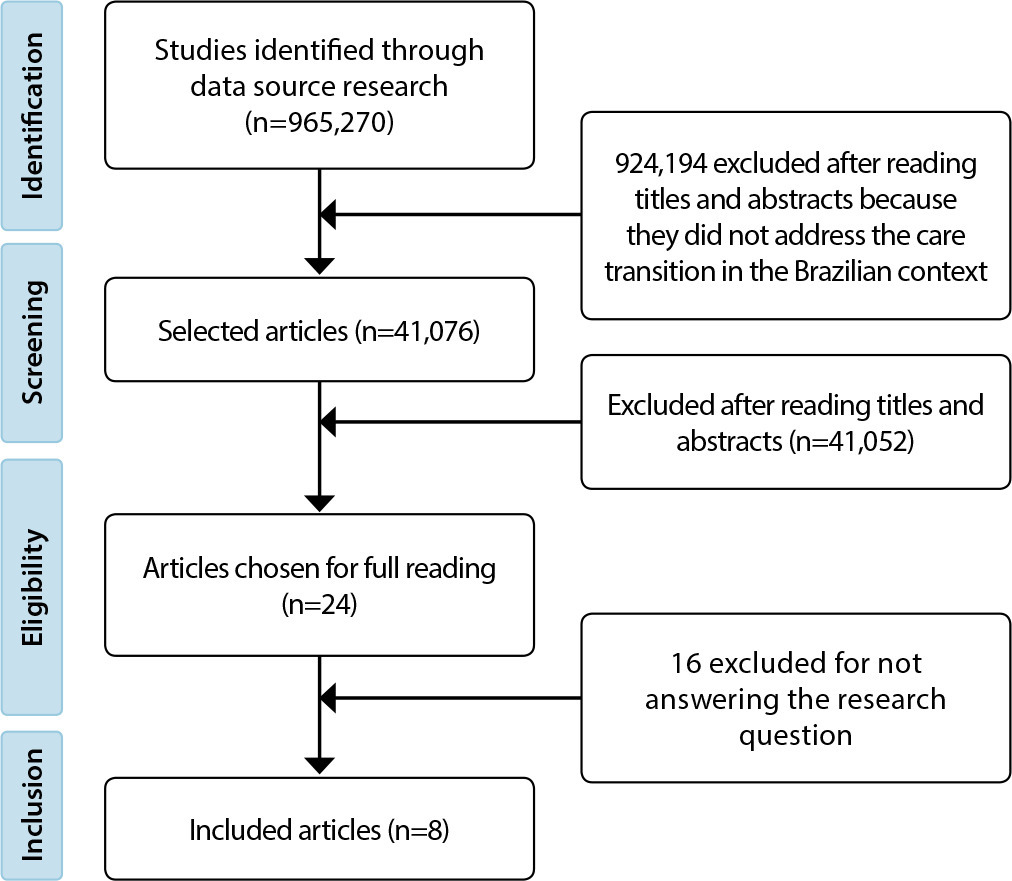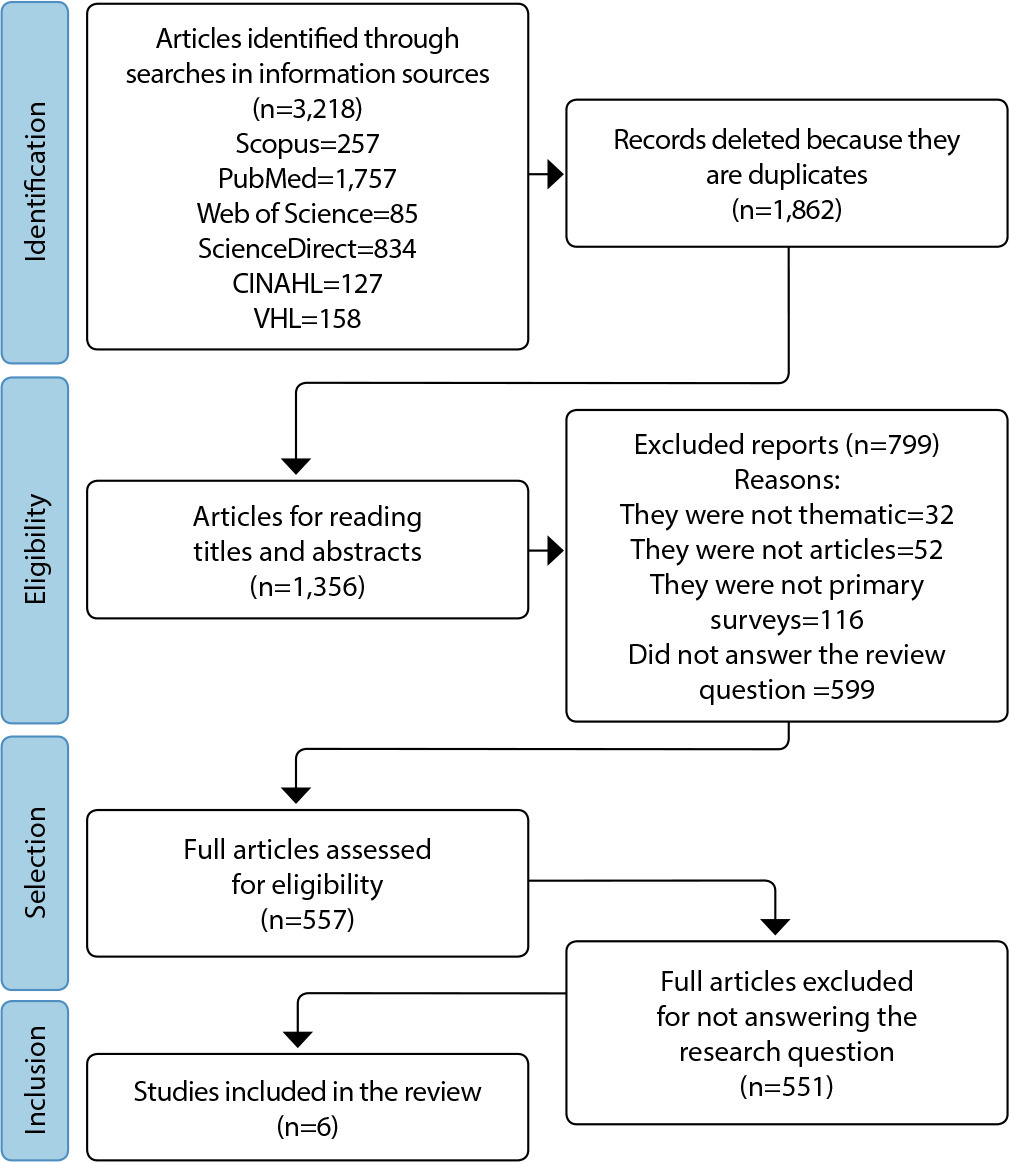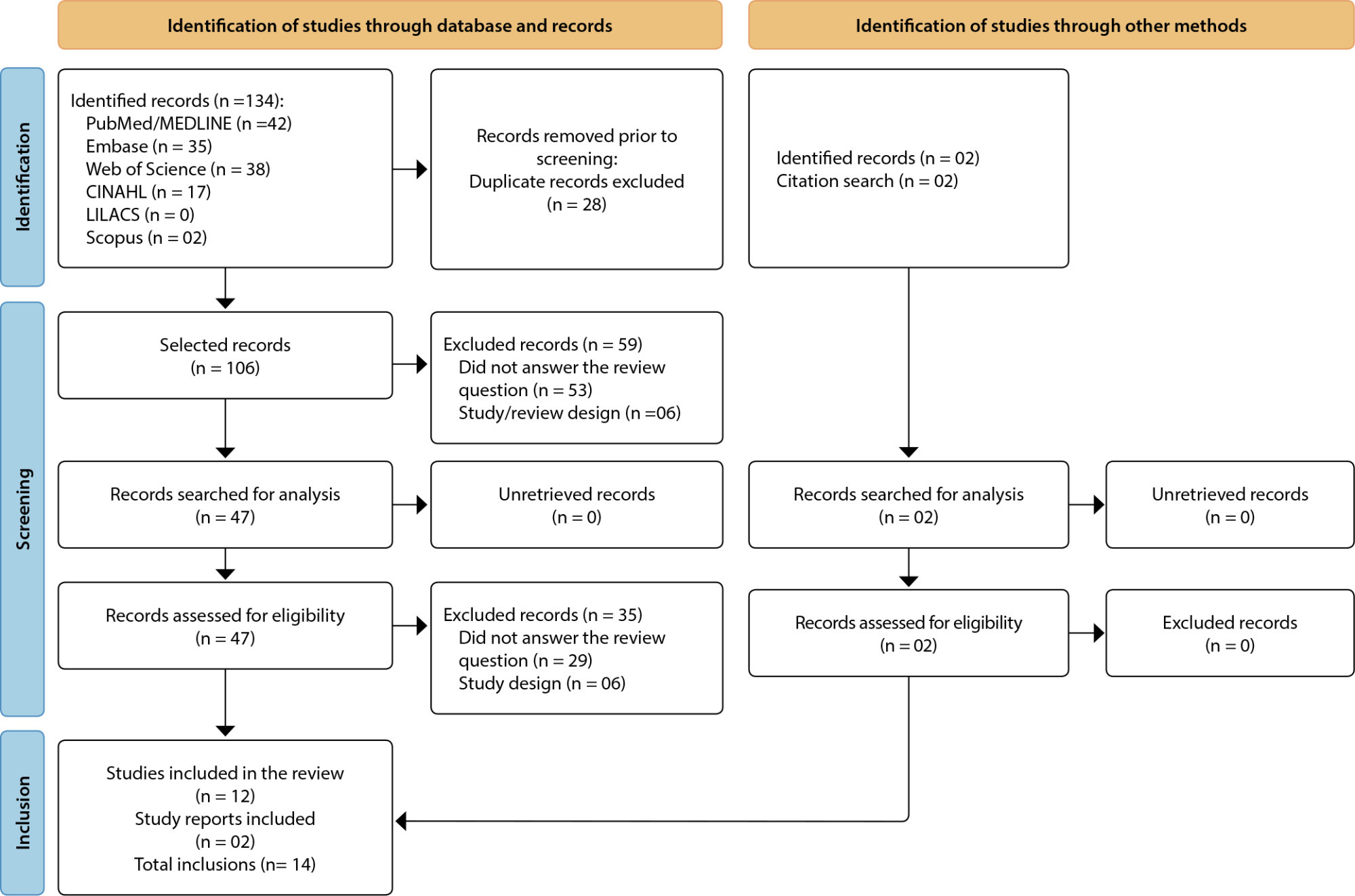-
ORIGINAL ARTICLE
Effect of cardiovascular biofeedback on nursing staff stress: a randomized controlled clinical trial
Revista Brasileira de Enfermagem. 2023;76(6):e20230069
12-04-2023
Abstract
ORIGINAL ARTICLEEffect of cardiovascular biofeedback on nursing staff stress: a randomized controlled clinical trial
Revista Brasileira de Enfermagem. 2023;76(6):e20230069
12-04-2023DOI 10.1590/0034-7167-2023-0069
Views0See moreABSTRACT
Objective:
to assess the effect of cardiovascular biofeedback on nursing staff stress when compared to an activity without self-monitoring.
Method:
a randomized controlled clinical trial, carried out with nursing professionals from a university hospital. The intervention group (n=58) performed cardiovascular biofeedback, and the control (n=57) performed an online puzzle without self-monitoring, totaling nine meetings over three weeks. The outcome was assessed using the Stress Symptoms and Work-Related Stress scales, and the biological marker heart rate variability. The generalized estimating equations method was used.
Results:
the intervention had no effect on self-reported instruments (p>0.050). However, there was an effect of time (p<0.050) on all heart rate variability indicators, demonstrating changes over the sessions.
Conclusion:
cardiovascular biofeedback showed promising results in the biological marker, suggesting that it can be used in nursing staff as a complementary therapy by promoting better autonomic nervous system regulation.

-
Transition of Care for Individuals with Mental Disorders in Brazil: A Contextual Analysis
Revista Brasileira de Enfermagem. 2023;76(6):e20230063
12-04-2023
Abstract
Transition of Care for Individuals with Mental Disorders in Brazil: A Contextual Analysis
Revista Brasileira de Enfermagem. 2023;76(6):e20230063
12-04-2023DOI 10.1590/0034-7167-2023-0063
Views0See moreABSTRACT
Objective:
To describe the contexts of care transition for individuals with mental disorders in the Brazilian setting.
Methods:
A contextual analysis was conducted through a scoping review. The search for studies was conducted in databases and thesis and dissertation portals, and the analysis was based on immediate, specific, general, and meta-contexts.
Results:
The sample, consisting of eight studies, indicated that the following factors are present in the contexts where care transition occurs: Peculiarities of care transition for individuals with mental disorders; Perspectives that can strengthen or weaken this transition; Approaches proposed in the past for the development of care transition; and Elements related to Brazilian legislation.
Final Considerations:
It is observed that the transition of care for individuals with mental disorders in Brazil takes place in various contexts of care levels. These variations present significant potentials and barriers in the care scenarios.

-
ORIGINAL ARTICLE
Sexual behavior according to undergraduate students: perspective of cross-cultural nursing and intersectional framing
Revista Brasileira de Enfermagem. 2023;76(6):e20220786
12-04-2023
Abstract
ORIGINAL ARTICLESexual behavior according to undergraduate students: perspective of cross-cultural nursing and intersectional framing
Revista Brasileira de Enfermagem. 2023;76(6):e20220786
12-04-2023DOI 10.1590/0034-7167-2022-0786
Views0ABSTRACT
Objective:
to discuss undergraduate students’ sexual behavior from the perspective of social markers and cross-cultural care proposed by Madeleine Leininger.
Methods:
descriptive-exploratory qualitative research, with a theoretical-philosophical foundation in the Transcultural Theory. Convenience sample was composed of 57 young people from two universities in Rio de Janeiro. The focus groups’ content were analyzed lexically using the IRAMUTEQ software.
Results:
four classes emerged: Young people’s sexual scripts: between the fear of an unplanned pregnancy and the risk of exposure to sexually transmitted infections; Affective relationships: trust in steady sexual partners, apparent sense of security and disuse of condoms; Sexual practices, gender and cultural determinants: distinction in men’s and women’s role; Sexual partnerships, negotiation of condom use and vulnerability to sexually transmitted infections.
Final considerations:
challenges are perceived for the attention to undergraduate students’ sexual health, who verbalized risky sexual behaviors due to sociocultural vulnerabilities.
Keywords:Cross-Cultural NursingIntersectional FramingSexual BehaviorSexually Transmitted InfectionsYoung AdultSee more
-
Sleep quality of nurses who worked in coping with COVID-19: an integrative review
Revista Brasileira de Enfermagem. 2023;76(6):e20230007
12-04-2023
Abstract
Sleep quality of nurses who worked in coping with COVID-19: an integrative review
Revista Brasileira de Enfermagem. 2023;76(6):e20230007
12-04-2023DOI 10.1590/0034-7167-2023-0007
Views0See moreABSTRACT
Objective:
to analyze sleep quality of nurses who worked coping with COVID-19 in scientific evidence.
Methods:
an integrative review, carried out in seven databases, including studies between December 2021 and June 2022, without language restrictions. The sample consisted of 15 primary studies.
Results:
nurses working in hospital, intensive care, outpatient care and teaching institutions constitute a vulnerable group for sleep disorders: latency, duration, efficiency and quality. The disorders identified involved insomnia at varying levels of severity: daytime dysfunction and morning sleepiness. Night work and low capacity for self-care were determinants of impaired sleep patterns.
Final considerations:
the COVID-19 pandemic contributed to greater vulnerability of nurses to changes in sleep, requiring strategies for risk management and well-being promotion.

-
ORIGINAL ARTICLE
Work and Mental Distress among Nurses in the Amazon Region of Brazil during the COVID-19 Pandemic
Revista Brasileira de Enfermagem. 2023;76(6):e20220792
12-04-2023
Abstract
ORIGINAL ARTICLEWork and Mental Distress among Nurses in the Amazon Region of Brazil during the COVID-19 Pandemic
Revista Brasileira de Enfermagem. 2023;76(6):e20220792
12-04-2023DOI 10.1590/0034-7167-2022-0792
Views0See moreABSTRACT
Objective:
To assess the relationship between psychopathological symptoms and the social, clinical, and occupational profile of nurses in the Amazon region of Brazil during the COVID-19 pandemic.
Methods:
A descriptive cross-sectional online study was conducted in 2020 with 261 nurses. The Symptom Assessment Scale-40 was utilized.
Results:
The presence of pre-existing conditions before the pandemic was associated with psychotism (p=0.044). Experiencing constraints and/or violence at work during the pandemic was associated with somatization (p=0.025), and working hours were associated with anxiety (p=0.025). Nurses predominantly exhibited symptoms related to fear (33.7%), tension (34.5%), and a sense that something is wrong in the mind (22.6%).
Conclusions:
A significant association was observed between working hours and anxiety symptoms, the experience of constraints and/or violence at work during the COVID-19 pandemic and somatization symptoms, as well as between pre-existing conditions and psychotism symptoms related to COVID-19.
-
Simulation training of caregivers at hospital discharge of patients with chronic diseases: an integrative review
Revista Brasileira de Enfermagem. 2023;76(6):e20230043
12-04-2023
Abstract
Simulation training of caregivers at hospital discharge of patients with chronic diseases: an integrative review
Revista Brasileira de Enfermagem. 2023;76(6):e20230043
12-04-2023DOI 10.1590/0034-7167-2023-0043
Views0See moreABSTRACT
Objective:
to identify evidence about the use and effects of clinical simulation for preparing caregivers for discharging patients with chronic conditions.
Methods:
an integrative peer review in the Scopus, PubMed, Web of Science, Cumulative Index to Nursing and Allied Health Literature, ScienceDirect and Virtual Health Library databases, from July to September 2022.
Results:
3,218 studies were identified, with a final sample consisting of four national and two international articles. Using simulation as an educational technology contributed to caregiver preparation in home care. In most studies, using clinical simulation included using other strategies to complement training: expository dialogued class, conversation circle and audiovisual resources.
Final considerations:
simulation proved to be efficient for training caregivers, with the active participation of family members and nurses in health education actions.

-
ORIGINAL ARTICLE
Feelings about birth by a group of high-risk pregnant women
Revista Brasileira de Enfermagem. 2023;76(6):e20230059
12-04-2023
Abstract
ORIGINAL ARTICLEFeelings about birth by a group of high-risk pregnant women
Revista Brasileira de Enfermagem. 2023;76(6):e20230059
12-04-2023DOI 10.1590/0034-7167-2023-0059
Views0See moreABSTRACT
Objective:
to understand feelings about birth among a group of high-risk pregnant women.
Method:
a descriptive and qualitative study, using Alfred Schütz’s social phenomenology as a philosophical theoretical framework. The study included 25 pregnant women undergoing high-risk prenatal care. The interview had the following guiding questions: tell me about your feelings regarding the moment of birth/childbirth; How do you deal with the high-risk diagnosis? What are your expectations for birth/childbirth?
Results:
five categories emerged: Fear of obstetric care; Fear of complications with the baby; Fear of cesarean section; Resilience in the face of high-risk pregnancy; and Expectations for birth.
Considerations:
high-risk pregnant women are afraid of the care they will receive, the risks and concern about the baby’s vitality at birth. The importance of care is emphasized, with a welcoming environment, bonding and communication between health team and pregnant woman.
-
ORIGINAL ARTICLE
Serious Game e-Baby Família: an educational technology for premature infant care
Revista Brasileira de Enfermagem. 2020;73(4):e20190116
06-24-2020
Abstract
ORIGINAL ARTICLESerious Game e-Baby Família: an educational technology for premature infant care
Revista Brasileira de Enfermagem. 2020;73(4):e20190116
06-24-2020DOI 10.1590/0034-7167-2019-0116
Views0See moreABSTRACT
Objectives:
to develop and assess the serious game e-Baby Família with parents of premature infants.
Methods:
a methodological study regarding the development of the serious game, with participatory design in scope definition, starting from parents’ learning needs about premature infant care. A qualitative approach was performed in the assessment stage with parents, with content analysis of the speech of the eight participants.
Results:
the following categories emerged: Realistic appearance of the virtual setting and game content and Gameplay implications for the use of e-Baby Família. The game was satisfactorily assessed regarding content, appearance and dynamics use, motivating participants to learn.
Final Considerations:
in the context of prematurity as a public health problem in Brazil and the need to strengthen family health education for care, the serious game was assessed as motivating and appropriate for health learning.

-
ORIGINAL ARTICLE
Aging, sexuality and nursing care: the elderly woman’s look
Revista Brasileira de Enfermagem. 2019;72:71-78
12-05-2019
Abstract
ORIGINAL ARTICLEAging, sexuality and nursing care: the elderly woman’s look
Revista Brasileira de Enfermagem. 2019;72:71-78
12-05-2019DOI 10.1590/0034-7167-2018-0015
Views0See moreABSTRACT
Objective:
to analyze the perception of elderly women about sexuality and practice of nursing care in this context.
Method:
a descriptive qualitative study. Fifty elderly women from Guanambi City – Bahia State were interviewed in 2016. Data collection technique was direct interview by using an unstructured script. Analysis of the semantic content described was carried out, and two empirical categories: the elderly woman’s view of nursing care in the promotion of sexual health and experience of sexuality in the elderly; and nursing care in the context of women’s aging.
Results:
it has been noted that the elderly women are afraid to talk about sexuality, especially with health professionals. By influences of society, they often exclude this issue of health care for elderly women.
Final considerations:
changes must be thought about assistance provided in relation to sexuality.
-
HIV infection in pregnant women and its challenges for the prenatal care
Revista Brasileira de Enfermagem. 2021;74:e20190784
01-22-2021
Abstract
HIV infection in pregnant women and its challenges for the prenatal care
Revista Brasileira de Enfermagem. 2021;74:e20190784
01-22-2021DOI 10.1590/0034-7167-2019-0784
Views0ABSTRACT
Objective:
To analyze the epidemiological profile of HIV infections in pregnant women.
Methods:
Analytical study with a quantitative approach.
Results:
The HIV rate in pregnant women increased from 1.5/1000 babies born alive, in 2010, to 3.3/1000 in 2017. There was a significant association between the prenatal and the variables educational level (p<0.0001), occupation (p=0.0105), gestational age (p < 0.0001), and type of delivery (p < 0.0001). The mean rate of adherence to the antiretroviral treatment in the prenatal was 68.8% (DP = ± 3.7).
Conclusion:
The high rates of HIV detection in pregnant women suggest the need to intensify the health care to women during the prenatal, guaranteeing an integral care, early diagnoses, and enhancing the strategies to improve the adherence to the antiretroviral treatment, aiming to achieve the viral suppression of the mother by the time of childbirth, thus diminishing the risk of a vertical transmission.
Keywords:HIV InfectionsInfectious Disease Transmission, VerticalPregnant WomenPrenatal CarePublic HealthSee more
-
EDITORIAL
Investigação qualitativa em tempos de pandemia
Revista Brasileira de Enfermagem. 2021;74:e74Suppl101
06-11-2021
Abstract
EDITORIALInvestigação qualitativa em tempos de pandemia
Revista Brasileira de Enfermagem. 2021;74:e74Suppl101
06-11-2021DOI 10.1590/0034-7167.202174Suppl101
Views0INTRODUÇÃOA investigação qualitativa permite a compreensão de realidades singulares que, dificilmente, são apreendidas a partir de um único prisma, assumindo-se cada vez mais como um campo inter e transdisciplinar–, com métodos e técnicas especificas que implicam a relação entre o investigador e os participantes para a colheita, análise e validação das transcrições e análise efetuada […]See more -
ORIGINAL ARTICLE
Clinical judgment and diagnostic reasoning of nursing students in clinical simulation
Revista Brasileira de Enfermagem. 2020;73(6):e20180878
09-21-2020
Abstract
ORIGINAL ARTICLEClinical judgment and diagnostic reasoning of nursing students in clinical simulation
Revista Brasileira de Enfermagem. 2020;73(6):e20180878
09-21-2020DOI 10.1590/0034-7167-2018-0878
Views0See moreABSTRACT
Objectives:
to determine the degree of association between clinical judgment and diagnostic reasoning of nursing students in clinical simulation.
Methods:
this is a correlational research design using a quantitative approach. The sample consisted of 41 nursing students who assisted a patient with vaso-occlusive crisis in a high-fidelity clinical simulation setting. The instruments used included the Lasater Clinical Judgment Rubric – Brazilian Version and the Diagnostic Thinking Inventory.
Results:
clinical judgment was associated with diagnostic reasoning (r=0.313; p=0.046), as well as the “noticing” aspect of clinical judgment with diagnostic reasoning (r=0.312; p=0.047).
Conclusions:
the results show that skills to interpret patient data are associated with diagnostic reasoning skills. Teaching clinical judgment skills is necessary to develop the diagnostic reasoning of nursing students.
-
ORIGINAL ARTICLE
Quality of life of nurse practitioners during the COVID-19 pandemic
Revista Brasileira de Enfermagem. 2022;75:e20201382
10-18-2022
Abstract
ORIGINAL ARTICLEQuality of life of nurse practitioners during the COVID-19 pandemic
Revista Brasileira de Enfermagem. 2022;75:e20201382
10-18-2022DOI 10.1590/0034-7167-2020-1382
Views0See moreABSTRACT
Objective:
to assess the quality of life of nurse practitioners during the COVID-19 pandemic and analyze related factors.
Methods:
cross-sectional and analytical study carried out with nurse practitioners. A questionnaire on sociodemographic characterization, work activities and changes perceived with the pandemic and WHOQOL-bref were used. To compare the groups of interest, analysis of covariance was used.
Results:
572 professionals participated, who had a mean total quality of life score of 56.79 (SD=13.56). In the relationship of variables with WHOQOL-bref, having two or more jobs and being a nurse were associated with better quality of life, but being a woman and working more than 50 hours a week was associated with a worse perception of the construct.
Conclusions:
the factors analyzed indicate a lower perception of quality of life associated with the social domain, requiring interventions that reduce the damage to professionals’ health and contribute to quality of care provided.
-
ORIGINAL ARTICLE
Nurses defending the autonomy of the elderly at the end of life
Revista Brasileira de Enfermagem. 2019;72(6):1639-1645
10-21-2019
Abstract
ORIGINAL ARTICLENurses defending the autonomy of the elderly at the end of life
Revista Brasileira de Enfermagem. 2019;72(6):1639-1645
10-21-2019DOI 10.1590/0034-7167-2018-0768
Views0See moreABSTRACT
Objective:
to understand how nurses deal with the elderly’s autonomy at the end of life.
Method:
qualitative, exploratory study, guided by the Grounded Theory. Ten nurses, eight doctors and 15 nursing technicians were interviewed between November 2016 and May 2017 at a university hospital in Rio de Janeiro/Brazil.
Results:
nurses deal with the elderly’s autonomy in compliance with the code of ethics and exercise leadership in actions and interactions to defend this right, evaluating, guiding and listening to the preferences of the elderly; interacting with the family; and sharing information with the health team.
Final considerations:
the elderly’s autonomy must be ensured in care planning, based on patient-centered communication and developed in the interaction among agents involved in care. The discussion on “Living Wills” Health Care Directives and principles of palliative care must be encouraged.
-
ORIGINAL ARTICLE
Factors associated with depressive symptoms in elderly caregivers with chronic pain
Revista Brasileira de Enfermagem. 2020;73(1):e20170782
01-27-2020
Abstract
ORIGINAL ARTICLEFactors associated with depressive symptoms in elderly caregivers with chronic pain
Revista Brasileira de Enfermagem. 2020;73(1):e20170782
01-27-2020DOI 10.1590/0034-7167-2017-0782
Views0See moreABSTRACT
Objective:
to identify factors associated with depressive symptoms in elderly caregivers with chronic pain.
Method:
the study included people 60 years of age or older who reported chronic pain and cared for another elderly person living in the same household (n=186). Statistical analyzes were performed using the Mann-Whitney test, univariate and multiple logistic regression.
Results:
most participants had no depressive symptoms (70.4%), 24.2% had mild depressive symptoms and 5.4% had severe symptoms. Univariate analysis showed that the variables family income, number of diseases, number of medications in use, pain intensity, overload and perceived stress were associated with depressive symptoms. Multivariate analysis found an association with perceived stress (95% CI 1.101-1207) and number of medications (95% CI 1.139-1.540) in use.
Conclusion:
factors associated with depressive symptoms in elderly caregivers with chronic pain were stress and the number of medications in use.
Search
Search in:
Nuvem de Tags
Aged (144) Atenção Primária à Saúde (239) COVID-19 (104) Cuidados de Enfermagem (269) Educação em Enfermagem (151) Educação em Saúde (139) Enfermagem (930) Estudos de Validação (131) Health Education (144) Idoso (208) Mental Health (149) Nursing (987) Nursing Care (306) Patient Safety (151) Primary Health Care (284) Qualidade de Vida (104) Quality of Life (106) Saúde Mental (145) Segurança do Paciente (150) Validation Studies (108)




